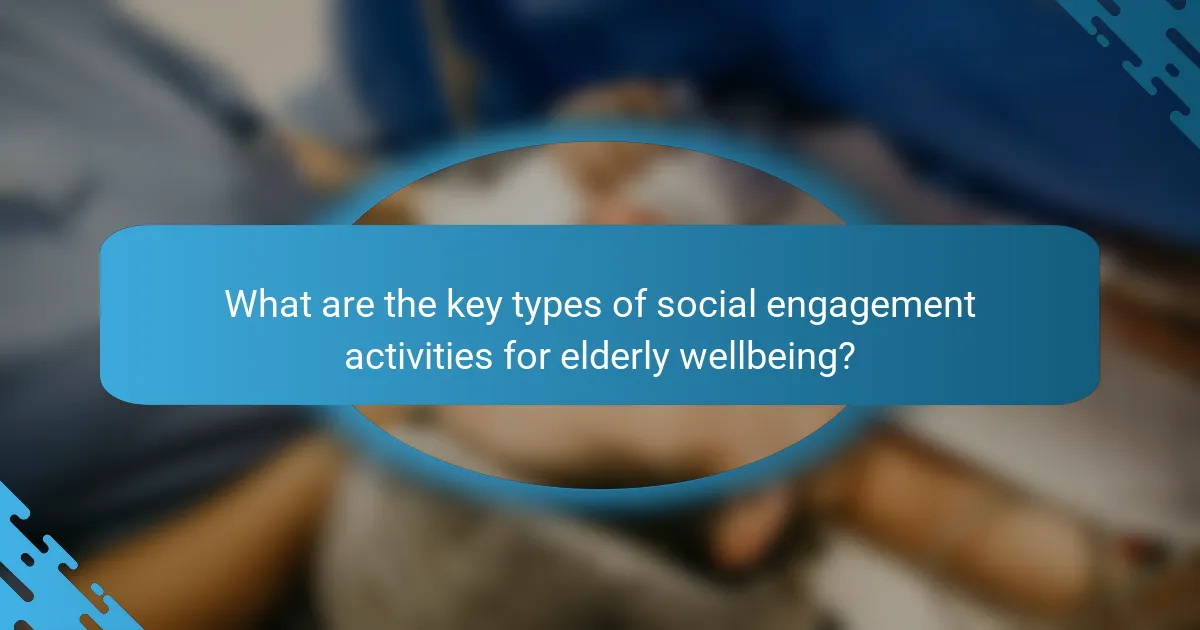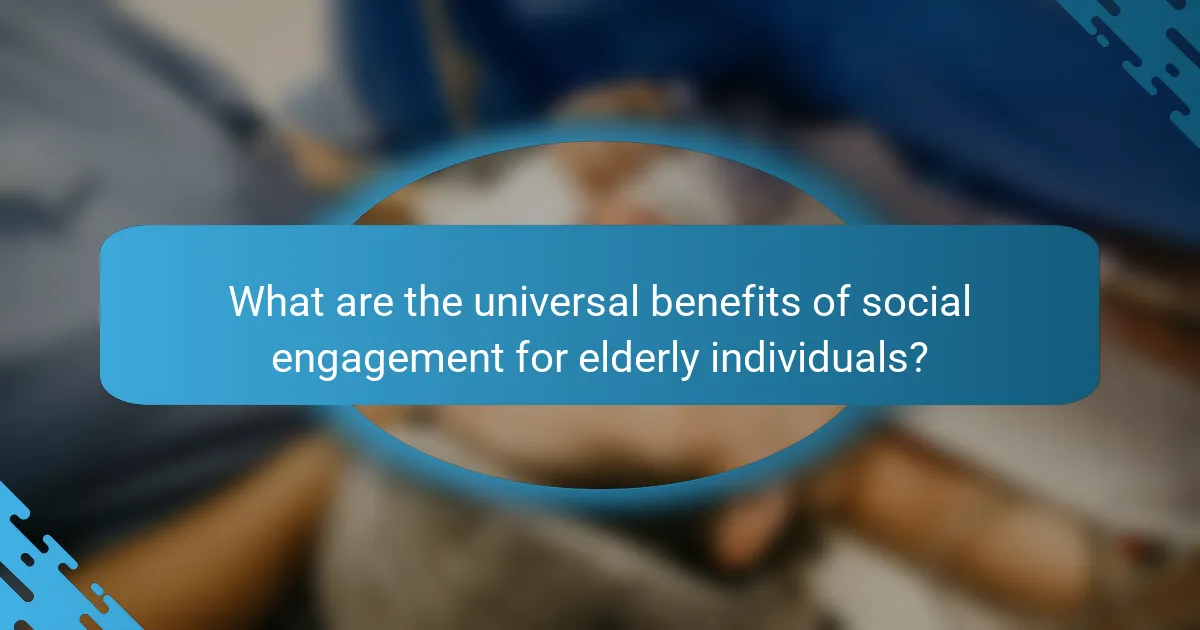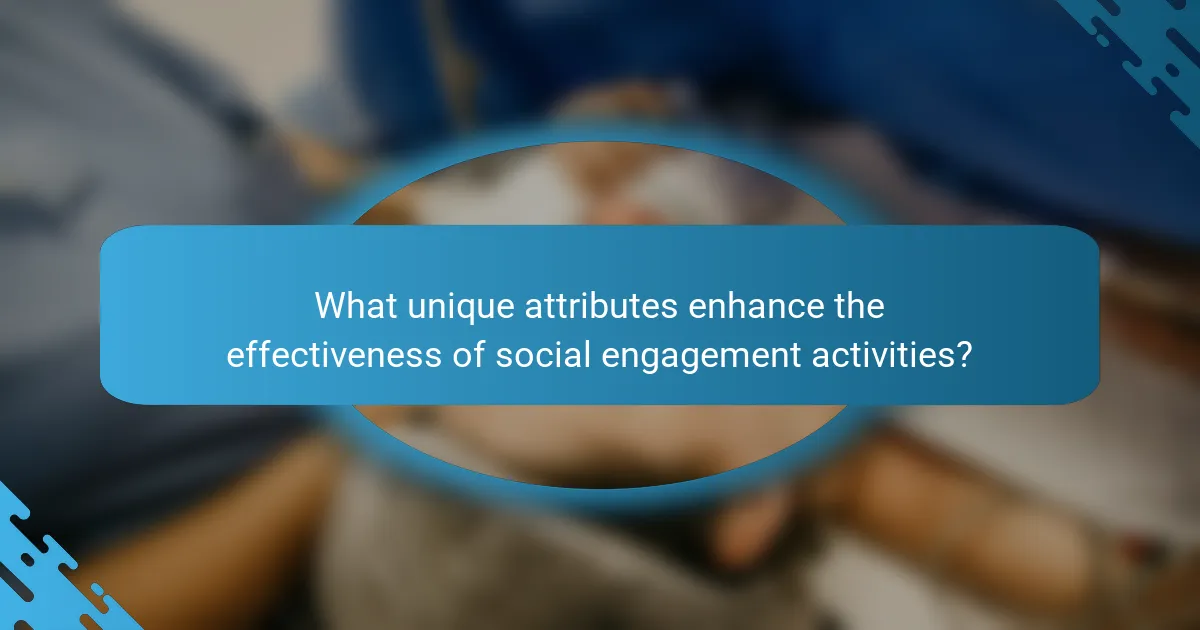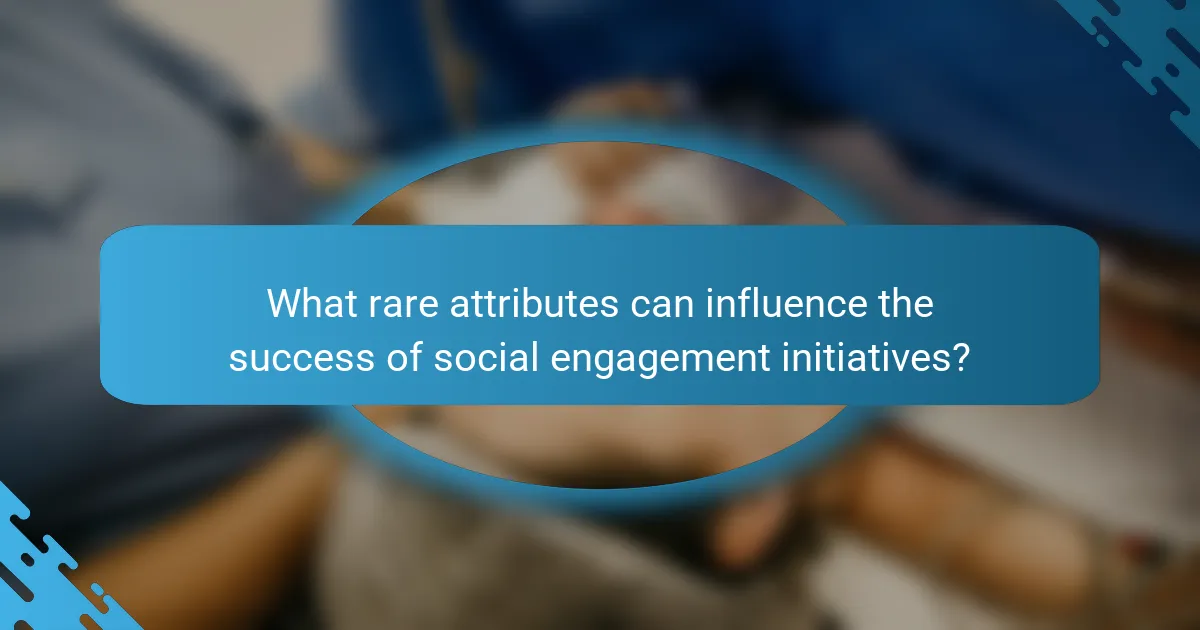Social engagement activities significantly enhance elderly wellbeing by reducing loneliness and improving mental health. Key types include group activities, volunteer opportunities, and technology-based interactions. Each type fosters connection and a sense of purpose. Implementing these activities through community centres or family initiatives can create inclusive environments that meet the needs of the elderly.

What are the key types of social engagement activities for elderly wellbeing?
Key types of social engagement activities for elderly wellbeing include group activities, volunteer opportunities, and technology-based interactions. Group activities foster community and social connections, while volunteering promotes a sense of purpose. Technology interactions, such as video calls, help maintain relationships. Each type enhances mental and emotional health, reducing feelings of isolation.
How do recreational activities enhance social interaction?
Recreational activities significantly enhance social interaction by providing opportunities for connection and engagement. They foster relationships, reduce feelings of isolation, and improve overall wellbeing among the elderly. Participating in group activities, such as arts and crafts, games, or exercise classes, encourages communication and collaboration. As a result, these interactions can lead to increased happiness and a sense of belonging. Engaging socially through these activities also contributes to cognitive stimulation, which is essential for maintaining mental health in older adults.
What specific recreational activities are most beneficial?
Engaging in recreational activities significantly benefits elderly wellbeing. Activities like group exercise, art classes, and gardening enhance social interaction, boost mental health, and improve physical fitness. Participation in these activities fosters a sense of community and belonging, which is essential for emotional stability.
In what ways do community service activities promote connection?
Community service activities foster connections by creating shared experiences among participants. Engaging in volunteer work encourages social interaction, reducing feelings of isolation often experienced by the elderly. These activities promote teamwork, allowing individuals to build relationships based on common goals. Additionally, community service can enhance a sense of belonging, as participants feel valued and recognised for their contributions. Studies indicate that social engagement through service can improve mental health and overall wellbeing for older adults.
What are examples of community service opportunities for seniors?
Volunteering at local food banks, participating in community clean-up events, mentoring youth programmes, assisting at animal shelters, joining senior citizen centres for social activities, and supporting hospital visitor programmes are excellent community service opportunities for seniors. These activities promote social engagement and enhance overall wellbeing.
How do educational programmes foster social engagement?
Educational programmes enhance social engagement by providing structured activities that promote interaction among the elderly. These programmes foster connections through group discussions, workshops, and recreational activities, leading to improved mental health and reduced feelings of isolation. Engaging in social activities can enhance cognitive function and emotional wellbeing, making a significant impact on overall quality of life. Studies show that participation in such programmes can decrease depression rates by 30%, highlighting their importance in elderly care.
What types of educational programmes are available for the elderly?
Various educational programmes are available for the elderly, focusing on social engagement and personal development. These include lifelong learning classes, technology training, art and music workshops, fitness and wellness programmes, and volunteer opportunities.
Lifelong learning classes enhance cognitive skills and foster social interaction. Technology training helps seniors navigate digital platforms, improving their connectivity. Art and music workshops promote creativity, providing emotional expression. Fitness and wellness programmes encourage physical health, contributing to overall wellbeing. Volunteer opportunities create a sense of purpose and community involvement.
These programmes significantly improve elderly wellbeing by reducing isolation and enhancing mental and physical health. Implementing these activities often involves partnerships with local organisations and community centres, ensuring accessibility and relevance to seniors’ interests.

What are the universal benefits of social engagement for elderly individuals?
Social engagement activities significantly enhance elderly wellbeing by fostering connection, reducing loneliness, and improving mental health. These activities include group outings, hobby clubs, and community events, which promote social interaction and provide emotional support. Engaging socially can lead to a 20% reduction in depression rates among seniors, as reported by various studies. Additionally, consistent social participation has been linked to improved cognitive function and a greater sense of purpose. Implementing these activities can be achieved through local community centres, volunteer programmes, or family-led initiatives.
How does social engagement impact mental health?
Social engagement activities significantly enhance mental health in the elderly by reducing feelings of loneliness and depression. Participating in social activities fosters a sense of belonging and purpose, which are crucial for psychological wellbeing. Engaging with peers can lead to improved cognitive function and emotional resilience.
Examples of effective social engagement activities include group exercise classes, book clubs, and community volunteering. These activities provide opportunities for interaction, stimulate mental processes, and promote physical health. As a result, elderly individuals experience increased happiness and a stronger support network.
Implementing social engagement initiatives requires collaboration with local organisations and community centres. Accessible transportation and tailored programmes can help ensure participation among the elderly. Ultimately, fostering social engagement is essential for enhancing the overall quality of life in older adults.
What physical health benefits arise from social activities?
Social activities significantly enhance physical health for the elderly. Engaging in social interactions can lead to improved cardiovascular health, increased mobility, and better overall fitness. Regular participation in group activities fosters a sense of community, reducing feelings of loneliness and depression, which are often linked to physical ailments. Studies show that seniors who are socially active tend to have lower blood pressure and a stronger immune system. Additionally, these activities can help maintain cognitive function, as they often involve physical movement and mental engagement.
How does social interaction contribute to emotional wellbeing?
Social interaction significantly enhances emotional wellbeing by fostering connections and reducing feelings of loneliness. Engaging in social activities can lead to improved mental health, increased happiness, and a greater sense of purpose. Regular participation in group activities, such as games or community events, promotes cognitive function and emotional resilience. Studies show that elderly individuals who maintain active social lives experience lower rates of depression and anxiety.

What unique attributes enhance the effectiveness of social engagement activities?
Social engagement activities for the elderly are enhanced by unique attributes such as personalisation, community involvement, and accessibility. Personalisation tailors activities to individual interests, fostering deeper connections. Community involvement promotes social networks, reducing isolation. Accessibility ensures participation for those with mobility challenges, maximising engagement.
How does personalisation of activities cater to individual preferences?
Personalisation of activities enhances elderly wellbeing by aligning social engagement with individual preferences. Tailored activities foster deeper connections, improve mental health, and increase participation rates. For instance, incorporating hobbies like gardening or art can significantly boost enjoyment and social interaction. Customisation also addresses unique attributes, such as mobility limitations or cognitive abilities, ensuring inclusivity and satisfaction in social settings.
What role does technology play in facilitating social engagement?
Technology enhances social engagement for the elderly by providing tools that foster connectivity and interaction. Digital platforms enable virtual gatherings, allowing seniors to participate in community activities from home. Video calls, social media, and online forums help reduce feelings of isolation, improving mental health and wellbeing. Additionally, specialised apps can facilitate hobby-based groups, connecting individuals with shared interests. This technology-driven approach caters to the unique needs of the elderly, promoting active participation in social engagement activities.

What rare attributes can influence the success of social engagement initiatives?
Rare attributes that can influence the success of social engagement initiatives for elderly wellbeing include personalisation, cultural relevance, and technology accessibility. Personalisation enhances participation by tailoring activities to individual preferences. Cultural relevance ensures that the initiatives resonate with the participants’ backgrounds. Technology accessibility breaks barriers, allowing more elderly individuals to engage through digital platforms. These unique traits can significantly enhance the effectiveness of social engagement activities.
How do cultural considerations shape social engagement activities?
Cultural considerations significantly influence social engagement activities for elderly wellbeing by tailoring them to diverse values and practices. Activities that respect cultural backgrounds foster inclusivity and enhance participation. For example, incorporating traditional games or storytelling can resonate with specific communities, promoting familiarity and comfort. Additionally, understanding cultural norms around communication can improve interactions, making activities more engaging and meaningful. Ultimately, culturally aware social engagement strategies lead to higher satisfaction and improved mental health outcomes among the elderly.
What innovative models have emerged in 2025 for engaging the elderly?
Innovative models for engaging the elderly in 2025 include virtual reality experiences, intergenerational programmes, and community-based technology hubs. These initiatives enhance social interaction, cognitive stimulation, and emotional wellbeing. Virtual reality allows seniors to explore new environments, while intergenerational programmes foster connections with younger generations. Community technology hubs provide training and resources, empowering seniors to engage with digital platforms. Each model addresses unique attributes of elderly wellbeing, promoting a more active and connected lifestyle.

What are the best practices for implementing social engagement activities?
To implement social engagement activities effectively, prioritise creating inclusive environments that encourage participation. Focus on activities that foster social connections, such as group exercises, art classes, or community outings. These activities enhance elderly wellbeing by reducing isolation and improving mental health. Regularly assess participant feedback to adapt and improve the offerings, ensuring they meet the evolving interests and needs of the elderly population.
How can caregivers effectively encourage participation?
Caregivers can effectively encourage participation by creating a supportive environment that fosters social engagement. Engaging elderly individuals in activities they enjoy enhances their wellbeing and combats feelings of isolation.
Offering a variety of activities, such as art classes, group games, or exercise sessions, caters to diverse interests. Incorporating familiar routines can increase comfort and willingness to participate.
Building relationships through consistent interaction helps establish trust, making elderly individuals more likely to join in. Additionally, setting achievable goals boosts confidence and motivation.
Recognising and celebrating small achievements reinforces positive experiences, encouraging ongoing participation in social activities.
What common mistakes should be avoided in organizing activities?
To avoid common mistakes in organizing social engagement activities for elderly wellbeing, focus on clear communication, appropriate scheduling, and inclusive planning. Miscommunication can lead to confusion, while poor timing may exclude participants. Neglecting diverse interests can limit engagement. Always prioritise accessibility and ensure all activities cater to varying mobility levels. Additionally, avoid over-scheduling, which can overwhelm participants and reduce enjoyment.
What strategies can optimize the impact of social engagement on elderly wellbeing?
Engaging socially significantly enhances elderly wellbeing. Strategies to optimize this impact include fostering community connections, promoting group activities, and utilizing technology for virtual interactions.
Community connections provide emotional support and reduce isolation. Group activities, such as arts and crafts or exercise classes, encourage participation and improve physical health. Technology, like video calls and social media, facilitates communication, especially for those with mobility challenges.
Implementing these strategies can lead to improved mental health, increased happiness, and a sense of belonging among the elderly.